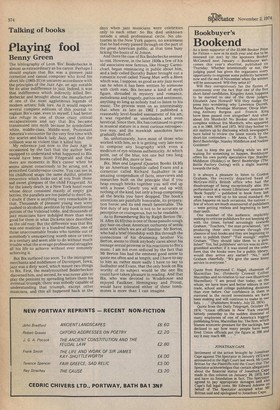Bookbuyer's
Bookend
As a keen supporter of the £5,000 Booker Prize for Fiction — now in its sixth year and due to be renewed (or not) by the sponsors Booker McConnell next January — Bookbuyer welcomes this year's shortlist, published on Thursday. Whether intentionally or not, the judging panel has given the organisers every opportunity to engineer some publicity between now and the end of November when the winner will be announced. Will they seize it? Will they surreptitiously fan the flames of controversy over the fact that one of the five short-listed candidates, Kingsley Amis, happens to be married to one of the three judges, Elizabeth Jane Howard? Will they nudge the press into wondering why Lawrence Durrell, Muriel Spark, Penelope Mortimer, Olivia Manning, Anthony Burgess and Francis King have been passed over altogether? And what about Iris Murdoch? No Booker short-list is complete without Iris Murdoch, who appeared on it in 1969, 1970 and 1973. Will they bother to stir matters up by disclosing which newspapers have failed to review the latest novels by the short-list contenders — Mr Amis, C. P. Snow, Beryl Bainbridge, Stanley Middleton and Nadine Gordimer?
Just to keep the pot boiling while we are waiting for something to happen, BookbuYer offers his own purely speculative tips: Stanley Middleton (Holiday) or Beryl Bainbridge (The Bottle Factory Outing) with a slight leaning towards the lady.
It is always a pleasure to listen to Gordon Graham, the recently departed head of McGraw-Hill's British office who had the disadvantage of being exceptionally able. His performance at a recent Librarians' seminar on 'Book Supply' — published in book form last week — was well up to his usual standard. As often happens on such occasions, the natives — few of whom are much enamoured of publishers — were getting restless and beginning to bare their teeth.
One member of the audience, implicitly seeking to criticise publishers for not keeping oP with the times, turned accusingly towards Graham. "Teachers," the man proclaimed, "are producing their own courses through the absence of text-books and they are beginning to want to publish them!" "Fair enough" replies Graham. "They should take them to a publisher!" Yes, but publishers' service was so slow, grumbled another; if it was stated on the order form that the books were for a public librarY, would they arrive any earlier? "No," said Graham cheerfully. "We give the same lousy service to everyone."
Quote from Raymond C. Hagel, chairman of Macmillan Inc. (formerly Crowell Collier Macmillan and no relation to our own illustrious Macmillan): "I am proud that today, on the whole, we have more and better editors in our trade, school and college publishing divisions than ever before. Our confidence in them Is mirrored in the record investments we have been making and will continue to make in our lists. . ." (Publishers Weekly, July 22, 1974). Quote from the Daily Telegraph, October 16, 1974: "Union officials in New York reacted bitterly yesterday to the sudden dismissal of many employees of one of America's biggest publishing firms, Macmillan Inc. The firm, which blames economic pressure for the sackings, has declined to say how many people have been fired. Union officials put the figure at 200 and say it may reach 400. . . ."
JONATHAN CAPE
Settlement of the action brought by Jonathan Cape against The Spectator in January 1972 was announced in the High Court last week. Mr Leon Brittan for the Plaintiffs told the Court that The Spectator acknowledges that certain allegations about the financial status of Jonathan Cape made in this column on January 29, 1972, had and have no foundation in fact. The Spectator agreed to pay appropriate damages and also Cape's full legal costs. Mr Edward Adeane on behalf of The Spectator accepted what Mr Brittan said and apologised to Jonathan Cape.


































 Previous page
Previous page